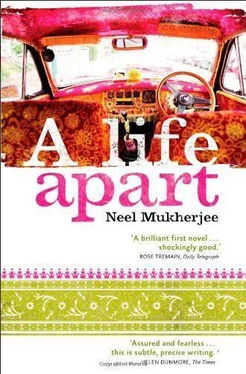‘Are you going home for the long vac?’
‘Yes.’ Long pause. ‘I need to. I have a summer job waiting for me.’
Why isn’t he asking any questions? Why hasn’t he even asked my name? Or what I read? He reached his hand backwards and turned the light off.
Ritwik wished he had kept a firm bolt on his mouth seconds after the next question came out but the cumulative effect of Matthew’s escape through dark alleyways, his refusal to give out normal information, his wound-up, nervy demeanour, could only have led to this. ‘So you aren’t out, are you?’
Surprisingly, Matthew appeared to be relaxed about this too. ‘No, I’m not.’ Brief but untense. He added, ‘I did join the Gay Pride march last week though. Along with all of Wadham.’
Ritwik’s mind did silent whoops of joy; the last piece of the puzzle had been handed to him on a plate. He refused to let Matthew realize this so he persisted with the outing questions. ‘You know, this could be the most supportive town to come out in.’
‘Yes. I know. But it’s my parents, you see.’
‘But parents almost always come round to their children’s point of view, don’t they? Eventually.’ What do I know about that one?
‘Yeah, but my parents are very. . very. . what can I say. . conservative.’
‘You might try testing the waters.’
‘You don’t know how old-fashioned they are. I was watching telly with them one evening and there was this shot of two blokes kissing — I forget what programme it was — and they freaked, kind of. My mother kept muttering “Disgusting, disgusting”, while my father stood up, spat on the telly and turned it off. Then they just sat there, silent and shaking, with. . disgust. I suppose.’
There was nothing to say after this. Ritwik curled himself closer around Matthew. As he drifted off, he lost the restraint not to say, ‘Stay. Please.’
Matthew remained silent and awake beside him.
The film of sweat, which joined and divided them where their skins touched, was the only indication to Ritwik how much time had elapsed between falling asleep and Matthew’s swift leap out of bed on to the floor to get hurriedly into his clothes. He didn’t even have time to assimilate this uncoupling before his eyes adjusted to the bending shape of Matthew pulling on his socks. By the time he got the words out, Matthew was at the door.
‘Wait. What’s wrong? Why don’t you stay?’ The words come out paratactic, congealed.
‘No, I’ve got to go. Goodnight.’
And he was out of the door, shutting it closed after him with not so much as a scrape or a creak.
Somehow the room seemed to amplify the sounds as Ritwik, wide awake now, listened to the front door slam shut, and then the cough of ignition, once, twice, before Matthew’s Renault kicked into its purring life. A narrow beam of car headlights swept flawlessly along the ceiling in a neat, brief arc through a crack where the curtains had not quite joined.
His heart was an eel again, doing its infinite loops around the same elegant path.
There it is, her name, in the respectful and prominent upper case customarily afforded to the author: VIOLET CAMERON, appended to the essay ‘Some Thoughts on Industrialization in Bengal: A Reply to Nikhilesh Roy Chowdhury’. And that juxtaposition is what stops Miss Gilby in her tracks as she is walking along the verandah, idly leafing through this latest issue of the Dawn , dated October 1903. It is no secret that Violet has been a member of the Dawn Society from ’97 or ’98. In fact, Miss Gilby collaborated with her on an essay on the education of Indian girls, which was published in these pages in ’99 along with articles by Annie Besant and by the Irish lady who went under the name of Sister Nivedita, and which went on to have far-reaching effects in the Anglo-Indian community not the least of which was the final excommunication of both Mrs Cameron and Miss Gilby from the society of their ‘own kind’, as James didn’t fail to point out repeatedly. But this coming together, this dialogue conducted at a distance between two people who have never met but have heard so much of each other through her, this sudden discovery of her inadvertent role of (of what? catalyst? channel? conductor?) medium, a role she has been so comprehensively ignorant of, this sends a thrill down her spine. It is as if all the coincidences of her worlds were chiming together in a big, resonant harmony.
She rushes into her study and takes in the article in one sitting. There are half echoes and muted soundings in Violet’s words: Miss Gilby has herself heard similar ideas from her and has had long discussions with her about self-government and that area forbidden to women — economics. The article appears at once familiar and strange. Violet seems critical of an unthinking and wholesale transplantation of Western industrialism to India, arguing that this will lead to similar problems faced by the West as a consequence of industrial capitalism — the stark division of the wealthy and the poor, class conflict, the gradual erosion of moral values and traditional modes of life and living.
One has only to cast a passing glance at the reports of the various commissions and blue books, which investigated the state of industrial life in the factories, mines and workshops between 1833 and 1842; or to read the pages of Engels’s ‘State of the Working Classes in England in 1844’ to convince oneself of the truth of the total degradation and suffering of the English working classes brought on by the Industrial Revolution , she has written.
The implied position of Mr Roy Chowdhury appears to be in favour of economic independence from British rule by a steady process of industrialization, which would then also become a remedy for the growing poverty of India. Miss Gilby’s head swims in the attempt to reconstruct his position from Violet’s essay. She is so fired up with curiosity that she immediately writes a note to him and summons Lalloo to deliver it.
Dear Mr Roy Chowdhury, Imagine my pleasant surprise when reading the latest copy of the Dawn , which was lying on the table in the drawing room, I discovered my friend Violet — Mrs Violet Cameron — to be the respondent to your article in a previous issue of the same journal. Having now read Violet’s article, but missing yours, I am greatly interested in reading it and conversing with you about such matters. Will you be so kind as to let me have the earlier issues of the journal? I gather you are very busy and occupied with a great many things of late but would Afternoon Tea next Wednesday suit you at all? I await your reply. Yours etc.
It is during the blotting of the note that understanding dawns on her. Part of the answer has been staring her in the face for some time now and she hasn’t been able to see it. All these meetings, this thronging of ‘Dighi Bari’ with strangers and important-looking men at all hours, these late nights, this air of resolve, conspiracy almost, of action and planning and conference, why, Miss Gilby thinks, this is all towards social and political ends. Economic self-determination, alleviation of the country’s chronic poverty — these were the noble aims they were working towards. Miss Gilby feels caught up in the great arc of political movements and it is not without its slight tinge of fear — what if these men are plotting a Revolution to overthrow the Raj? Where does she stand then?
She pushes the questions away as figments of her overactive imagination, so prone to creating scenarios of disaster and calamity when there are none in the horizon. She decides to write to Violet and chide her affectionately for not letting her know in advance of this correspondence between herself and Mr Roy Chowdhury in Dawn , but she doesn’t go ahead with it for she has written to her only a week ago, besides, who knows, Violet may have written to her and the post had been delayed unreasonably, as it was so frequently. She will wait to hear from Mr Roy Chowdhury.
Читать дальше












